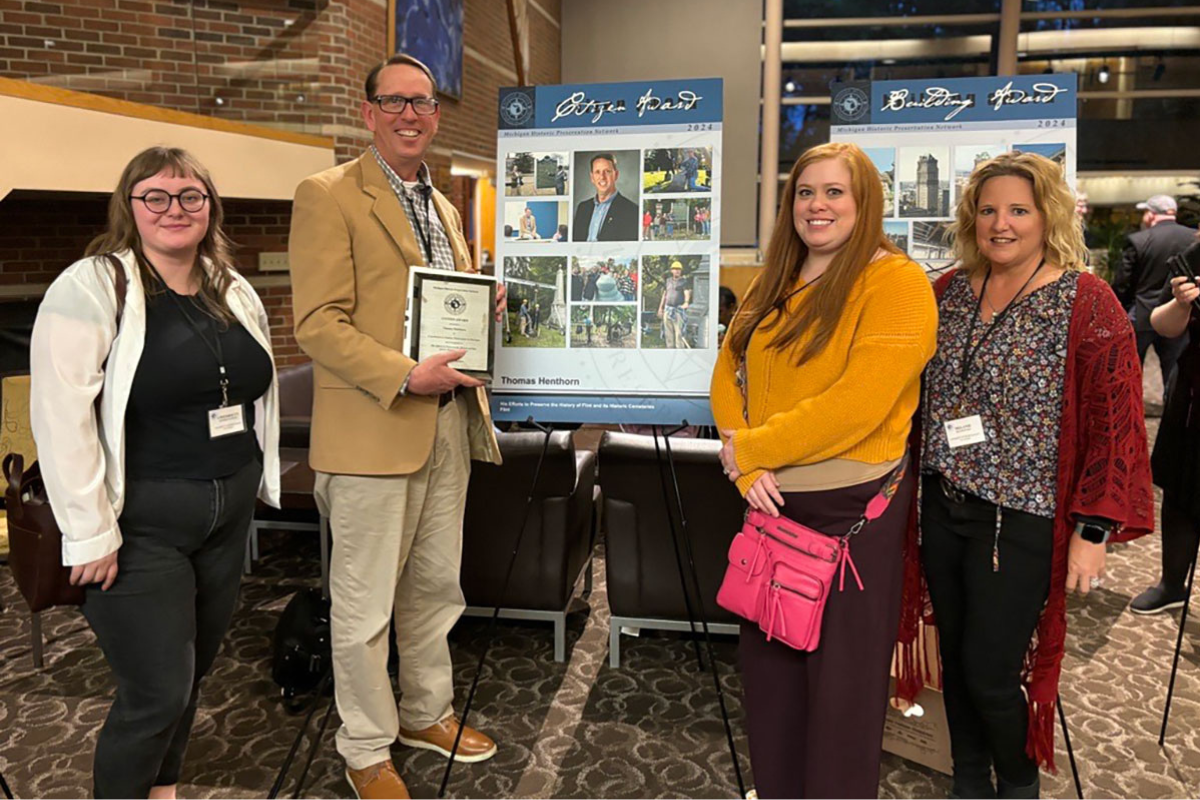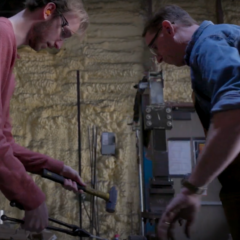UM-Flint's Henthorn honored by Michigan Historic Preservation Network with 2024 Citizen Award

Cemeteries are not just physical spaces; they're integral parts of a community's social fabric and reflect how its members perceive life, death, and death's place within its culture. How they are maintained also reflects the community's commitment to its heritage.
Thomas Henthorn, the Wyatt Endowed Professor of Public History at the University of Michigan-Flint, has distinctly impacted the Flint community through his cemetery preservation work. His goal is to bridge the gap between history as an academic discipline and the contemporary world, connecting the past with the present.
"My pastor encouraged me to get more involved with the church, but I told him I couldn't sit in any more meetings," Henthorn said. "So he took me to the Old Calvary Cemetery – the oldest cemetery in Flint – and said, 'Can you do anything about this place?' I said, yes, this is in my wheelhouse! And my cemetery restoration and preservation work started there."
But Henthorn doesn't do this work alone. UM-Flint history students can intern with him during the summer as he works on restoring headstones in Old Calvary and Glenwood cemeteries.
"After working at Old Calvary for four years, Glenwood contacted me because they were impressed with the work that we were doing, so we started helping with restorations there, too," said Henthorn. "I now host historical walking tours of Glenwood a few times a year and offer preservation workshops for the community."
The Michigan Historic Preservation Network recognized Henthorn with the 2024 Citizen Award for preserving Flint's history. Henthorn was keen to include the student interns who helped him in this work and invited them to the network's annual conference in Kalamazoo in May.
Suzy Ferguson, a senior anthropology major from Davisburg, was one of the students who worked with Henthorn last summer to restore the Bishop family burial site at the Glenwood Cemetery.
"I learned so much from that experience; everything was new to me," said Ferguson. "It was really hard physical work, but I felt so good at the end of each day because I knew I was doing good work and making an impact. I also got to meet the Bishop family – the ones the airport is named after – and that was exciting. Seeing how historical preservation work like this can profoundly impact people today is wonderful."
Ferguson received a scholarship from MPHN to attend the conference, where she took advantage of the various architectural tours and networking opportunities.
"Because of my experience with Professor Henthorn, I'm pursuing a minor in historical preservation, and the conference opened my eyes to all of the opportunities in cultural heritage management. I wouldn't have known about this career path if it hadn't been for my internship," Ferguson said.
Melanie Purkis, a senior history major from Charlotte with a minor in historical preservation, also worked with Henthorn on last summer's restoration project and continues assisting him with the cemetery preservation workshops he offers throughout Michigan.
"It's not as simple as just cleaning up the headstones," said Purkis. "You have to take care not to damage them in the process, and there are many regulations you must keep in mind. You can't just say, 'Hey, this is old, let's fix it!' You have to research ownership, history and whether or not it is a protected monument or from an Indigenous community, which will have different rules and regulations. Some people love the field work but all that research, that detail, that's what I truly enjoy."
After retiring from a 30-year career in information technology, Purkis began her studies at UM-Flint to shape the next chapter of her life.
"I didn't know what I wanted to do yet, but I knew I wanted to train in and do something completely different," Purkis said. "Before I interned with Professor Henthorn, I had no idea that a career in historic preservation would speak to me like it does. I'll graduate from UM-Flint this August and head directly to Eastern Michigan University in the fall, which has one of the premier graduate programs in historic preservation. It will prepare me for the work I want to do at the state level, helping manage large restoration projects. Henthorn helped open those doors for me."
Restoration primarily involves cleaning the headstones from damaging natural elements — insects, moss and mold. This kind of work can be done by most people because it doesn't involve special tools, just gentle cleaners. For headstones that are damaged or sinking, the team works to level or repair them, but they take care that the work they do isn't permanent because the headstone will need to be able to be adjusted and repaired in the future.
"Some might question why this work matters to me, Professor Henthorn or the other interns, but I think it's important to remember that every headstone represents a person, and that person was important to someone. No one should be neglected," said Purkis.
Kat Oak
Kat Oak is the communications specialist for the College of Arts, Sciences, and Education. She can be reached via email at [email protected].


